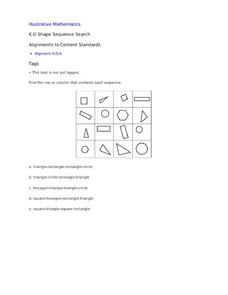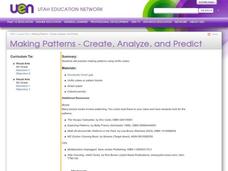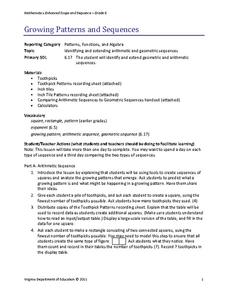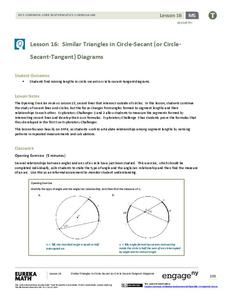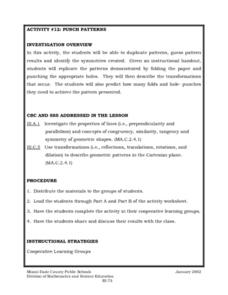Charleston School District
Identifying Irrational Numbers
These numbers have some personality! Are they rational or irrational? The lesson examines the definitions of rational and irrational numbers and shows examples of how to identify them.
Illustrative Mathematics
Shape Sequence Search
Learning that size and orientation don't affect the classification of shapes is a big step for young mathematicians. Support children with developing this key understanding by looking at the array of shapes included in this resource. For...
Virginia Department of Education
Complex Numbers
Build on your class' understanding of real numbers as they begin working with complex numbers. Pupils begin with an exploration of i and the patterns in the powers of i. After developing a definition for i, they simplify complex number...
Curated OER
Math Can Be Electrifying
Students explore how math can be used to calculate and analyze how electricity causes air pollution. Students design a campaign to educate family members on ways they can save electricity. They create a graph that compares two electric...
Virginia Department of Education
Transformations
Geometry in life-sized dimensions! Using enlarged graph paper, pupils perform a series of transformations. By recording the initial and final placement of the images, they are able to analyze the patterns in the coordinates during a...
Curated OER
Making Patterns - Create, Analyze, and Predict
Fourth graders practice making patterns using Unifix cubes and identify, analyze, and determine rules for describing numerical patterns involving operations and nonnumerical growing patterns. They also find an example of a pattern in...
Curated OER
Patterns and Possibilitiies
Learners gain an understanding of the value and importance of patterns in mathematics. Through video, interaction and hands-on activities, students identify concrete and abstract patterns incorporating logic and deductive and inductive...
Curated OER
Patterns
Students explore simple patterns. In this mathematical thinking geometry lesson plan, students repeat clapping and snapping patterns, and determine what comes next in sound and movement patterns. Students recite "Hey, Diddle, Diddle,"...
Curated OER
Shapes in Our World
Help your students explore shapes. They classify shapes and identify them in their everyday world. Plane shapes are explored, and they classify and identify the plane shapes.
Curated OER
Design Patterns in Everyday Life
Students find symbols and patterns in everyday life. In this patterns lesson, students break into groups and look for specific patterns and symbols. Students record their findings. Students create a graphic organizer with the information.
Curated OER
Patterns in Pascal's Triangle
Fourth graders investigate the patterns found in Pascal's Triangle by identifying patterns on different items -- including the teachers clothing, a checker board, a quilt, and a spider web. The students access the referenced computer...
Curated OER
It Just Keeps Going and Going...
Students explore patterns, identify patterns, and complete a variety of patterns. They view and discuss an online video and identify the different patterns from the film, then using a hundreds grid create an original pattern using their...
Curated OER
Math Quilts
Students examine geometric quilt patterns to identify how math may have been used to help slaves escape to freedom. They slide, flip and turn geometric shapes to create a map quilt.
Virginia Department of Education
Growing Patterns and Sequences
Learners explore, discover, compare, and contrast arithmetic and geometric sequences in this collaborative, hands-on activity. They build and analyze growing patterns to distinguish which kind of sequence is represented by a set of data...
Curated OER
Ocean Exploration: Shapes and Patterns Under the Sea
So many shapes in our vast oceans. Young explorers can discover new shapes in a variety of ways in this lesson. One way is having free exploration with a pattern shape kit handed out by the teacher. Another is by viewing a video, Ocean...
Inside Mathematics
Hexagons
Scholars find a pattern from a geometric sequence and write the formula for extending it. The worksheet includes a table to complete plus four analysis questions. It concludes with instructional implications for the teacher.
Curated OER
Patterns With Sounds and Motions Challenge
For this recognizing patterns worksheet, students identify the sequence of pictures with sounds and motions, and choose the one that is likely to come next. Students solve three answers.
Concord Consortium
The Bus Route
Patterns are extremely helpful when solving a puzzle. Young scholars attempt to find times a bus will pass each stop. They identify a pattern in the known stop times to identify the solutions.
EngageNY
Similar Triangles in Circle-Secant (or Circle-Secant-Tangent) Diagrams
First angle measures, now segment lengths. High schoolers first measure segments formed by secants that intersect interior to a circle, secants that intersect exterior to a circle, and a secant and a tangent that intersect exterior to a...
Curated OER
Pre K Learn About Patterns
Students create patterns. In this patterns lesson, students view examples of patterns, walk around the school and identify patterns and complete pattern interactives. Students create patterns with KidPix and with objects.
Curated OER
Patterns
Students identify patterns in equations. In this algebra lesson, students write equations of problems with recurring patterns. They relate and model real life situation using functions.
Curated OER
Identifying the Patterns
Apple, banana, apple, banana...what's next? Youngsters practice recognizing patterns using these object sequences. For the first four patterns, they examine the start of a set, find the pattern, and complete the subsequent drawings in...
Curated OER
Patterns Everywhere!
Learners recognize and demonstrate the patterning of numbers and objects in our environment. They create a pattern using geometric shapes and find a missing number in a sequence.
Curated OER
Punch Patterns
Fifth graders duplicate patterns, guess pattern results and identify the symmetries created. They are given an instructional handout, 5th graders replicate the patterns demonstrated by folding the paper and punching the appropriate...



